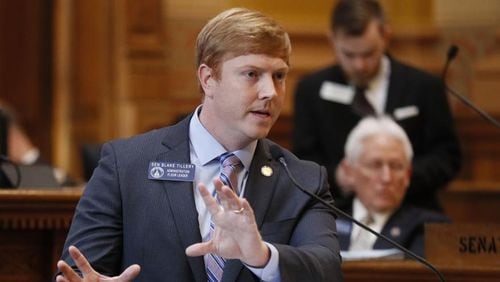The Georgia Senate on Tuesday passed a $36.1 billion state budget for the coming year that includes raises for 300,000 educators and state workers and more money for law enforcement, education and mental health programs.
The raises are included in the spending plan for fiscal 2025 — which begins July 1. The Senate passed it 53-1, setting up negotiations with the House for a final deal before the session adjourns Thursday. The House passed its version of the budget earlier this month.
State tax collections have been slow for the past year. But the state is sitting on $16 billion in “rainy day” and undesignated reserves, so Gov. Brian Kemp and lawmakers have backed higher spending since the session began in January.
State spending has grown from about $26.6 billion in fiscal 2020, the last budget plan approved before the COVID-19 pandemic hit, as tax collections flowed in during the economic uptick that followed. Revenue stalled out in fiscal 2024, and it is not expected to gain much momentum next year.
All that matters because the money the state collects in taxes helps pay for K-12 schools, colleges, public health care, prisons, policing, business regulation, roads and a host of other services.
Under the Kemp budget plan endorsed by House and Senate leaders, rank-and-file workers would receive 4% increases — up to $3,000 — and teachers would get $2,500 more.
Some other employees, such as those in state law enforcement, would get the 4% raises plus an extra $3,000.
More than $200 million extra would go to school districts to pay for transporting children to school, something local officials have requested for years, and more than $100 million would go to schools for security upgrades.
The Senate added $5 million to the security upgrades to start paying for Lt. Gov. Burt Jones’ proposal to offer public school teachers a $10,000 annual stipend to take voluntary firearms courses and carry guns in schools.
Both chambers backed hundreds of millions of dollars more for Medicaid, the state-federal health care program for the poor and disabled, including big money to increase payments to some medical providers.
The Senate removed most of the money the House agreed to as part of a plan to give big raises to judges of the Georgia Supreme Court, the state Court of Appeals and the superior courts.
The Senate added $15 million more for security technology to block cellphone signals in state prisons. Lawmakers began funding that program earlier this year in the midyear budget in hopes of stopping rampant inmate cellphone use.
Senators added $6 million to provide more literacy coaches in low-performing schools, but they cut in half the extra funds the House put into the budget for reduced-priced school breakfasts and lunches for students.
About the Author








